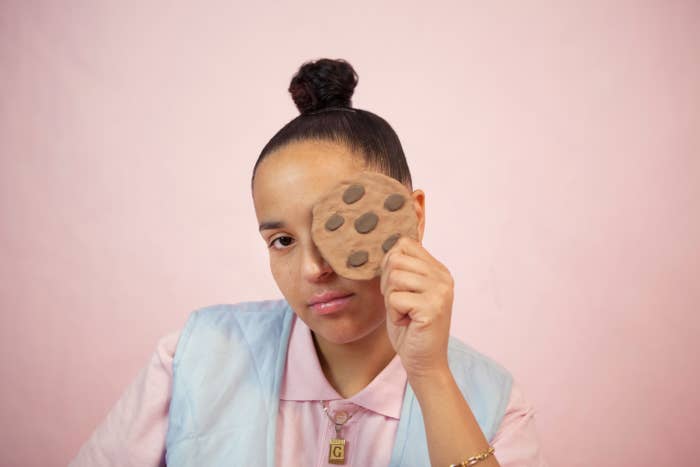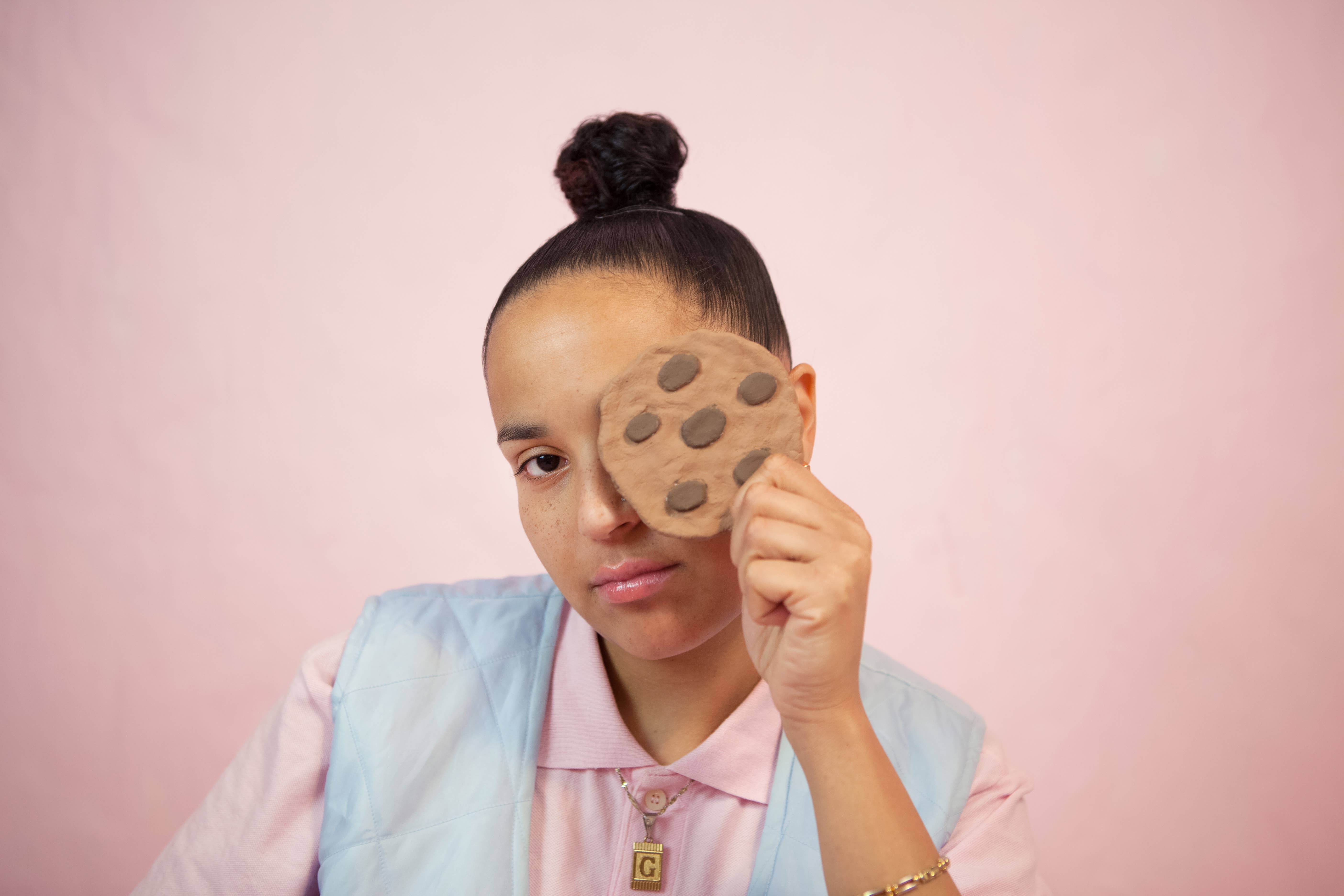
Fresh from a trip to Gambia to reconnect with family, Fatima muses optimistically on her sophomore album And Yet It's All Love. Released at the end of last year, four years post the iconic debut of her Yellow Memories LP, this second coming is both powerful and smooth. Going into the studio with Stones Throw's MNDSGN, J.D Reid (D Double E, Mabel), Purist (Daupe), Taz Arnold (Kendrick Lamar), Swarvy and Natureboy Flako, the First Lady of Eglo Records serves up her unique jazz, soul and funk sound, blended with a contemporary twist. Deeply personal, exploring the events of her previous long-term relationship, inspiration came sporadically to the East London-based artist.
Immersed in the diverse culture incubated throughout her beloved capital, Fatima describes And Yet It's All Love as a "progressive journey", which has helped refine her skills and realise new talents. Hyped by her supporters Toddla T and Benji B, Fatima's regular spot on the radio station NTS showcases the sketchbooks of sounds which she references throughout her compositions. Preparing to get out there on tour this spring, the skilled singer-songwriter is just coming off a month-long series of performances at London's Roundhouse, as part of Roundhouse Presents.
Complex caught up with Fatima to discuss life lessons learned and creative processes experienced during the past four years.
How did it feel after those four intensive years of writing about a relationship that troubled you, to step back and hear the music that represented that era?
I always write from a truthful place taken from reality. Sometimes I can be inspired by something that I've seen or heard separate from myself but, usually, it's based on my own reality, so that process in itself felt natural. I didn't have to force anything. When I go through something, I write about it whilst living life. Being in that relationship didn't always make it easy to find my inspiration to write because, during that time, I wasn't always feeling super inspired. I don't usually write music every day, but I can just go into the studio and write something about an event that has affected me quite easily. During the time that I was in this relationship, I was very stressed out. It wasn't a great time and I had to search for that inspiration.
You must always be honest and true to yourself and that's what listeners really appreciate. Relationships are common ground for the listener and the writer—it's a place we can all relate from—that's what I connect to when I listen to other people's music. Whatever an artist is writing about, I always respect honesty and truth. Sometimes it can feel mad to write about something totally unrelated to yourself. I have one tune on the album like that: "I See Faces In Everything", which is literally about me looking up to the sky and taking notice of everything that is around me, then I just created a crazy story around that.
What do you think this album has taught you about yourself as an artist?
As time goes by, I keep honing my craft and polishing my skills—it's a natural progression. Progression is an ongoing process for every human being. I like seeing improvements in myself, such as the arrangement of melodies, harmonization and writing, and I gradually improve in confidence. The more you do something, the better you get at it. I've been writing for a while now, writing with the people on this album, and I feel like it gelled well. All the pain of the relationship feels worth it now because it all made for good tunes. Putting my thoughts onto paper lifted a weight off my shoulders as if someone else can feel helped by experiences that positive. That is not what I intended when I wrote—I just wrote whatever was on my mind. Writing songs is almost like writing a diary.
At what point do you introduce a producer to a track?
I like creating a track from scratch with people. But with 90% of these tracks, I was already in the studio with the producers and we just had a couple of beats from a track they had made, or we just sporadically made a track from the beginning. I'm not always involved in every step of the production, but I can be on occasion. I know what I like and what I don't like, so we will always begin with a conversation to be sure we like all of the elements that are in there. I'll usually do all the singing and writing myself; sometimes I can hear a melody on the tube, or I might be in the street and I will record that song just to remember the melody. I have a lot of saved ideas that I haven't yet touched, but it's cool to have this sketchbook of sounds. Each track on this album came from an original place in the studio with a producer.
There are strong opinions and characters in art, and you need to respect everybody.
How hard is it communicating an aesthetic or an idea to producers?
It can be hard. However, the biggest struggle I have with myself is that I can be so indecisive that I can't make a decision and settle for one thing. I will be halfway through asking 'can you do this?' and describing something and then a suggestion is made which sends me in a completely different direction. I will usually be saying, "It's not really like that, keep going until you find it." Then I'll know when they realise that right sound. I never want a producer to feel like they're my puppet—I want them to bear their own creativity and for their ideas to shine through. If there's something I don't like, I will speak up... I guess that means meeting in the middle to achieve what we both want. There are strong opinions and characters in art, and you need to respect everybody.
Plastic People and Deviation were a prominent feature of your music around the time of the first album. Do you still go to music events and clubs?
I go out quite a lot, but it does come in waves. There was a time when I was going Plastic People all the time! I think it was one of the best clubs I have ever been to. Alex Nut just started his own night, which I'm really into—great sounds! Music in London is really exciting at the moment, with great DJs. As an example, I'm super into Bloc Boys; they have their own radio show and they play live quite a lot. I really like House Of Pharaohs, Octavian, Mogwai, Ezra Collective and the jazz movement happening in the city. It's an inspiring time and I'm in love with it all. It's cool how the world is opening up to more diverse sounds, and with social media, we see what's popping everywhere: across the globe, things are merging more, people are more open-minded. I go out quite a bit—wherever there is quality music, I'll be there.
Are you into UK drill?
I am. I'm not a connoisseur of the genre, but I listen to drill and quite a lot of UK rap. I listen to a lot of rap in general—I like the flows, and the hard beats. It's a London thing! I love Harve and Fredwave too. Especially love House Of Pharaohs! Those guys are coming with a different style: it's more bouncy, it's not as dark. There's a shift in energy, a mix of everything, and there's a lot of contrast.
Do you have any aspirations to guest vocal on any specific artists' tracks?
I do, but it has to feel like the right collaboration. The latest feature I did was on Teklife, which isn't out yet. I really love Chet Faker; he's a huge singer-songwriter from the States. I like collaborating with people. I want to create more music, push myself more and travel a lot. We're touring in Oslo and Spain, and spending quite a bit of time playing in Germany as well. That's how my year is starting. I love being in the studio making music, but touring and playing live is also such a rich experience.

